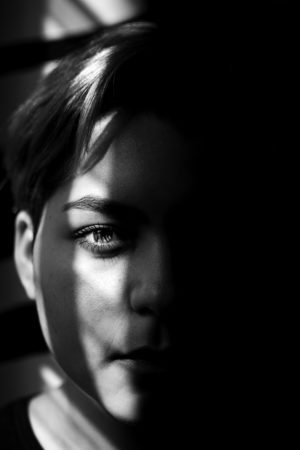You have no items in your cart. Want to get some nice things?
Go shopping
For a short three months, the 26th St. Bistro delivered its promise of a good job. I liked working there. I could talk my way into a decent tip if given the chance and I always got plates out on time. The regulars there were mostly women, mostly older, who’d come in and gossip about grandsons and politics over buttered bread. When the conversation ran dry around nine, they would depart, leaving a prismatic array of oiled coffee and crushed sugar. It would be a quick, loping sweep back to the steamed cacophony of the kitchen, where I’d dump the lipstick-stained mugs into the sink and nod to Amanda, our prep chef, with whom I became endlessly and irrevocably obsessed.
Amanda had worked at the bistro for at least three years. She had thick, pale arms and could pound through a bag of carrots with a meat cleaver. No one crossed her, or even came close. She scared the shit out of everyone. Even our boss Kim rarely looked Amanda in the eye.
“Soup’s on?” she’d ask, her gaze shifting elsewhere, the doorframe maybe, or a bird outside.
“Yeah,” Amanda would say. “Out in ten.” The quiet chatter of forks and hushed conversation often drifted through the silence until someone blinked, and it was always, always Kim.
I interacted with Amanda as little as possible under the keen, pressing knowledge that any conversation I tried would inevitably be annoying, and every joke I slipped her way would be left unread. “Thanks,” I’d say when picking up plates, and she’d grunt in response. That was about it for our friendship.
Amanda’s frame shielded the prep table from view and often I’d catch Kim peeking to see how much longer the food would take. Each time she did so, teetering over on her clogs, there was an anxious fear in her eyes, like Amanda was a skittish bear whose mood could flip on a dime. It made me nervous. I often wished that Kim would stop.
I didn’t know much about Amanda, other than she liked opera and seemed to be sad. This sadness drew me to her. It was irresistible, in its own way, a mystery to her massive, mooning face. No one knew much about her. She showed up to work in a bumperless Honda and tended to frown when leaving her car. Midday, she liked to smoke on the steps outside, looking over the snow-spackled parking lot, and blow long, gray streams from the gap between her teeth. I never talked to her on break – that was always her time – but sometimes I found myself watching from the dining room with its triptych windows and powdered-cheek seniors at Amanda with her anger and oily tattoos. I was an astronaut, and she, a distant, pockmarked meteor. All the cold, empty space between our worlds, and I, face smashed up against the telescope, wanted to be closer, to know the atmosphere, to feel its weight.
No one on staff seemed to talk to Amanda, even though she worked five days a week, prep, lunch, and dinner, not to mention acting manager whenever Kim wasn’t around. She didn’t hire people – that was Hunter’s job – and she didn’t yell at them either. I worked at the 26th St. Bistro for three months and never spoke to Amanda for more than a minute. It wasn’t for lack of want. Everyone seemed to understand that if you didn’t talk to Amanda, she wouldn’t talk to you, and this was better, in some way, than another, hypothetical alternative.
Of course she had her quirks, and in between the empty slats of her countenance, sometimes light would shine, a secret glimpse into her life. One time her phone rang and she rushed to the walk-in fridge. “Barrett?” I heard her say. “I told you not to call at work.” She also listened to opera, which I loved. It was such a romantic, silly thing for someone so gloomy and silent. I noticed she liked Italian more than German, though she never listened to the same suite twice. Every aria was punctuated by the heavy thud of her knife.
When my shift got off, I always tried to make a point of saying goodbye to her. I hoped this action fell into the penumbra of “acceptable kindness,” as I was stuck in this rut of a vision where she’d look up and smile and I’d see something I hadn’t before, an end, maybe, to the enigma of her being. Instead she would glance up and raise her eyebrows in acknowledgement, a gesture as opaque as everything else about her.
Amanda also had the odd habit over volunteering for Saturday clean, the worst shift in the house. Even Kim winced when assigning it. But Amanda would usually interrupt and volunteer that no, she’d do it, yeah, that’s fine. It could’ve been a money thing. But it didn’t feel like it.
I had to do Saturday clean once and was stuck elbows-deep in dishwater long past midnight. Driving home, listening to late-night NPR, I discovered a wet noodle in my hair. Pulling it out like some wriggling grub, I was surprised to discover I was blinking back tears. I submitted my two-week notice at the first sign of spring.
My last day arrived on the wet, flat end of May. Everyone looked unwashed and irritable. Even the gaggle of seniors seemed grumpier than usual, like hospice loomed and the grandkids no longer called. I wanted my coworkers to know it was my last day but couldn’t think of an appropriate way to share the news, and so I just waited my tables and smiled obediently at Kim. Clocked in my hours and clocked out at nine.
Amanda had Saturday clean again that night, and seemed to be in a rush to get people out the door. Maybe she was having a party, I thought, or a pint of beer to herself once everyone was gone. Maybe she liked to do the monologue from the Pirates of Penzance.
I found her in the back, redolent of nicotine, and she stapled my receipts with the heel of her day. “Last day, huh,” she said gruffly and I was so taken aback I nodded once and said nothing more.
“Cool,” she told me, sliding the packet into the register. You could hear cars driving by outside, their tearing grumble fading from view. I was the last person left besides her in the kitchen. The special that night had been salmon au vin, and the kitchen was so messy it almost seemed magical. Plates gleamed with grease, wine glowed in the bottom of every glass. There was a terrible poetry to it all. The washer gurgling up mouthfuls of steam. A pool of lettuce in the sink.
I wanted to offer to help, but I didn’t, because I knew she’d say no. As I turned away, I felt her watching me leave, and wondered if I was now complicit in this empty silence, the general ignorance and apathy most people assigned her. I opened the doors of the 26th St. Bistro to a wash of cold May air. It seemed the loneliest place in the world. Walking across the parking lot, for a second, I thought I heard opera starting up in the kitchen – something low and interesting – but then a car passed, and the sound got quieter and quieter, till I couldn’t hear it anymore.





